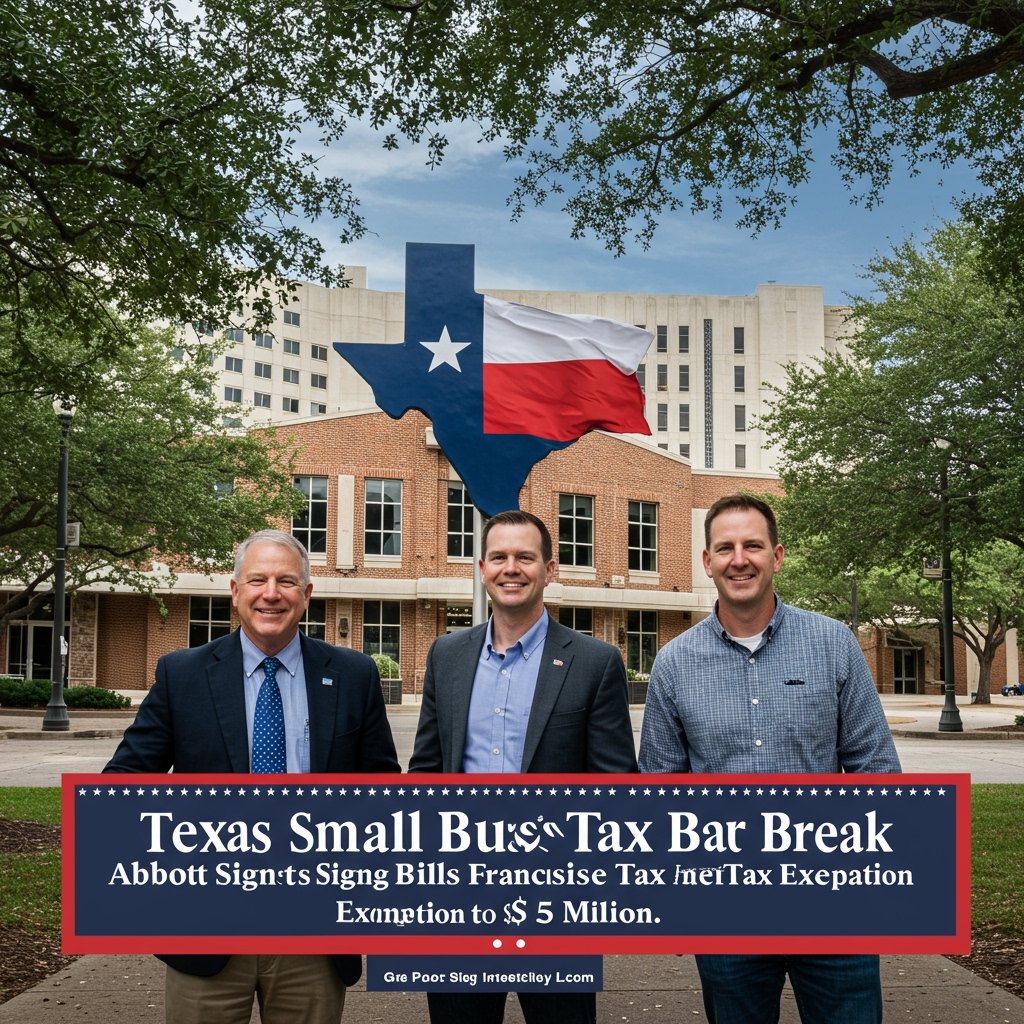Historic Tax Relief for Texas Small Businesses
Texas Governor Greg Abbott has officially signed House Bill 210 into law today, enacting a significant expansion of the state’s franchise tax exemption for businesses. The signing marks a pivotal moment for small and medium-sized enterprises across the Lone Star State. This newly enacted legislation, set to take effect on September 1, 2025, dramatically raises the threshold for exemption from the state’s franchise tax. Under the provisions of HB 210, businesses with annual revenue up to $5 million will now be entirely exempt from this state tax, a substantial increase from the previous cap of $2 million. This change is poised to redefine the tax obligations for a large segment of Texas businesses, potentially freeing up significant capital for reinvestment and growth.
Legislative Intent and Bill Specifics
Authored by State Representative Jane Smith, House Bill 210 navigated the legislative process with the specific goal of providing tangible financial relief to smaller businesses grappling with various economic pressures. The decision to increase the exemption cap by a considerable $3 million reflects a clear legislative intent to reduce the tax burden on a broader array of businesses that might fall outside the traditional \”small\” category under the old $2 million definition but are still fundamentally distinct from large corporations with vast resources. The bill represents a direct policy choice to use the state’s tax system as a tool to incentivize and support the continued establishment, operation, and expansion of businesses within this critical revenue bracket. Representative Smith’s authorship underscores the bill’s origins in addressing specific concerns voiced by constituents and the broader business community regarding the impact of the franchise tax on their bottom line. The legislative discourse surrounding HB 210 often centered on how to best foster an environment conducive to business success and job creation, particularly for enterprises that are past the initial startup phase but still require significant capital for scaling and operational needs.
Projected Impact and Beneficiaries
The most widely cited projection regarding the concrete impact of HB 210 is its potential to benefit approximately 50,000 additional small and medium-sized businesses throughout Texas. This figure highlights the extensive reach of the updated exemption and its potential to significantly alter the financial landscape for tens of thousands of companies. For businesses whose annual revenue falls between $2 million and $5 million – a crucial segment of the state’s economy – this bill means they will no longer be subject to the state’s franchise tax starting in the fiscal year following the effective date of September 1, 2025. This potential tax relief could free up significant capital for these enterprises, capital that would otherwise be allocated to tax payments and compliance costs. Supporters argue that this saved money can then be potentially reinvested directly back into the business: funding expansions, upgrading equipment, investing in technology, increasing marketing efforts, or crucially, applied to hiring new staff. In an era where workforce development and job creation are key economic indicators, enabling businesses to use more resources for hiring could have a ripple effect across local economies. Furthermore, for businesses facing rising costs of materials, labor, or services due to inflationary pressures or supply chain issues, this tax exemption provides much-needed financial breathing room, helping them absorb increased expenses without necessarily passing them entirely onto consumers or cutting back on operations.
Support from Business Community
The legislation has garnered strong support from various business advocacy groups and stakeholders across Texas. Prominent among these is the Texas Association of Business, which has vocally championed HB 210 throughout its journey through the legislature. Organizations like the Texas Association of Business see this exemption expansion as a vital measure necessary to support entrepreneurs and foster sustained economic growth within the state. Their support stems from the belief that reducing the tax burden on businesses operating below the $5 million revenue mark allows owners and operators to allocate resources more effectively towards productive activities that drive economic activity, rather than simply covering tax liabilities and the administrative costs associated with tax compliance. In the current economic climate, characterized by persistent inflationary pressures and rising operational costs that impact businesses of all sizes, proponents view this tax relief as particularly crucial for maintaining the viability, competitiveness, and growth trajectory of Texas’s middle-tier businesses. The exemption is framed by these supporters not merely as a tax break, but as a strategic investment by the state government into the businesses that form the backbone of local communities and contribute significantly to statewide prosperity. They argue that empowered and financially healthier businesses are better positioned to innovate, expand, and create the jobs necessary for Texas’s future economic success.
Anticipated Impact on State Revenue
While the bill is widely celebrated by the business community it is designed to assist, it is not without potential fiscal challenges for the state itself. Concerns have been raised regarding the impact this significant expansion of the tax exemption could have on state revenue collections. By exempting an estimated 50,000 additional businesses from the franchise tax, the state treasury could experience a noticeable reduction in the amount of tax revenue collected annually from this source. The specific fiscal year where this potential impact is expected to be most keenly felt is fiscal year 2026, primarily due to the bill’s effective date of September 1, 2025. The franchise tax, while not the largest source of state revenue, contributes billions of dollars annually to the state budget, funding various public services and programs. Policymakers and budget analysts within the state government will need to carefully monitor revenue collections from the franchise tax in the years following the exemption’s implementation to accurately understand the full financial implications for the state’s budget planning and overall fiscal health. The concern centers on the trade-off between providing significant tax relief to businesses and maintaining sufficient state revenue to cover existing and future expenditures. Balancing the goal of fostering economic growth through tax incentives with the necessity of funding state operations and services remains a key consideration as the state prepares for the implementation of HB 210.
Looking Ahead: Implementation and Effects
The choice of September 1, 2025, as the effective date provides both businesses and the state government with over a year from the signing date to prepare for the changes brought about by House Bill 210. Businesses currently paying the franchise tax with annual revenue between $2 million and $5 million will need to adjust their future financial planning and tax strategies, accounting for their new exempt status. Similarly, state revenue forecasters and budget officials will refine their projections for the 2026 fiscal year and beyond to incorporate the anticipated reduction in franchise tax collections from the newly exempted entities. The signing of HB 210 by Governor Abbott represents a deliberate and substantial policy shift aimed at significantly reducing the tax burden on a considerable portion of Texas’s business community. It is widely expected to stimulate growth, provide crucial financial breathing room for businesses facing economic pressures, and potentially encourage further entrepreneurship. However, its long-term success will also be measured by how effectively the state manages the resulting impact on its revenue streams. This legislation is poised to be a defining factor in the operating and economic environment for tens of thousands of Texas businesses in the coming years, marking a notable change in the state’s approach to taxing its middle-tier commercial enterprises.






